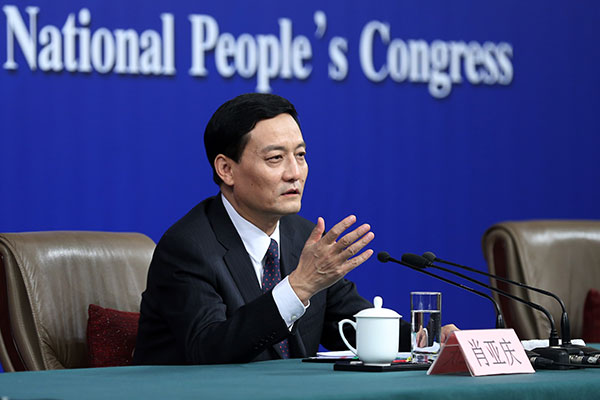
Xiao Yaqing, head of the State-Owned Assets Supervision and Administration Commission, speaks on March 11 on the sidelines of the 13th National People’s Congress.[Photo/Xinhua]
China will conduct equity diversification at the group level in selected centrally administered State-owned enterprises and advance mixed ownership reform for SOEs in sectors that are fully competitive this year, the head of a top regulator said.
The government will enhance corporate governance for SOEs under mixed ownership, and carry out explorations on systems of special right stock, Xiao Yaqing, head of the State-Owned Assets Supervision and Administration Commission, said at a news conference during the first session of the 13th National People’s Congress.
Xiao said China will systematically summarize the experiences from programs to pilot the granting of equity stakes to employees in mixed-ownership, State-controlled enterprises, as well as expand the coverage of these pilots and set up long-term incentive and restraint procedures.
The central government has also pledged to advance the reform of State capital and SOEs-by formulating lists of investor rights and obligations regarding oversight and regulation-and deepen reforms in State capital investment and management companies, according to the annual Government Work Report presented by Premier Li Keqiang on March 5.
The country’s centrally administered SOEs made 206.67 billion yuan ($32.65 billion) in profit during the first two months of this year, up 22.6 percent year-on-year, while their operating revenue jumped 10.9 percent to 4.1 trillion yuan, official data show.
China has 98 centrally administered SOEs, down from 117 five years ago as the central government has been restructuring central SOEs to improve their earning ability and efficiency.
According to the government plan, China will continue moving forward with the improvement and restructuring of SOEs and the joint stock reform of centrally administered SOEs. It also will move faster to give shape to corporate governance structures with effective checks and balances and flexible and efficient market-based operating procedures.
“We will work consistently to make SOEs into leaner, better performers, increase the core competitiveness of their main businesses and strengthen, expand and increase returns on State capital,” Xiao said.
Peng Huagang, deputy secretary-general of the commission, said the government will also set up sound market-based exit mechanisms that ensure only the strongest survive. It will move faster to deal with inefficient and ineffective State-owned assets this year.
“We will work to channel State capital to important sectors and crucial fields that concern national security, the lifeblood of the economy, people’s well-being, key infrastructure projects and strategic industries,” Peng said.
In 2017, China’s SOEs at all levels handed in the best performance over the past five years. Total sales revenue reached 50 trillion yuan, up 14.7 percent from a year earlier, and profits surged 23.5 percent to 2.9 trillion yuan.
